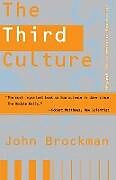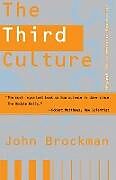Third Culture
Einband:
Kartonierter Einband
EAN:
9780684823447
Untertitel:
Beyond the Scientific Revolution
Autor:
John Brockman
Herausgeber:
Touchstone
Anzahl Seiten:
416
Erscheinungsdatum:
07.05.1996
ISBN:
0684823446
Zusatztext Jill Sapinsley Mooney San Francisco Chronicle Fascinating...reading The Third Culture is... like playing tennis with someone who's better than you are. It will really make you stretch those mental muscles. Informationen zum Autor John Brockman is a literary agent and author specializing in scientific literature. He established the Edge Foundation, an organization that brings together leading edge thinkers across a broad range of scientific and technical fields. Klappentext This eye-opening look at the intellectual culture of today--in which science, not literature or philosophy, takes center stage in the debate over human nature and the nature of the universe--is certain to spark fervent intellectual debate. Chapter 1 GEORGE C. WILLIAMS "A Package of Information" Niles Eldredge: I remember the English evolutionary geneticist John Maynard Smith remarking to me that he was astonished to find out that George Williams wasn't in our National Academy. Williams finally got elected in 1993. When I visited him in Stony Brook in the mid-1980s, he told me he was having a hard time getting grant support for his research, and I couldn't believe that. The two thoughts converged, because George really is the most important thinker in evolutionary biology in the United States since the 1959 Darwin centennial. It's astonishing that he hasn't gotten more credit and acclaim. He's a shy guy, but a very nice guy, and a very deep and a very careful thinker. I admire him tremendously, even though we've been arguing back and forth for years now. George C. Williams is an evolutionary biologist; professor emeritus of ecology and evolution at the State University of New York at Stony Brook; author of Adaptation and Natural Selection: A Critique of Some Current Evolutionary Thought (1966), Sex and Evolution (1975), Natural Selection: Domains, Levels, and Challenges (1992), and coauthor (with Randolph Nesse, M.D.) of Why We Get Sick (1995). George C. Williams: Evolution, in the sense of long-term change in a sexually reproducing population, depends on the relative rates of survival of competing genes. Given that organisms may find themselves in an environment where there are close genealogical relatives, it follows that an organism is expected to react to cues of kinship in a certain way, so as to discriminate among the individuals it encounters on the basis of kinship, and be more benign and cooperative toward closer kin than more distant kin or nonrelatives. My interest in evolution started in the summer of 1947, when I spent six weeks in the Painted Desert with a paleontologist named Sam Welles, who had a group of students there, officially in a summer course, but we spent most of the time swinging picks and shovels, digging fossils, as part of Welles' research project. He was a specialist in Triassic amphibians. Evenings were spent sitting around the campfire talking about things like evolution. For the first time in my life, people -- real biologists, real scholars -- were willing to sit and listen to my opinions. I was twenty-one years old. I certainly became interested in many aspects of evolution then, and shortly after that I signed up at the University of California at Berkeley for a course in evolution with Ledyard Stebbins, who at the time, and for quite a while thereafter, was the world's primary expert in evolution with respect to things botanical. Stebbins' course introduced me to Theodosius Dobzhansky's Genetics and The Origin of Species. Stebbins was great, but Dobzhansky's book was what got me interested in natural selection as a process. At the University of Chicago, my job was strictly teaching. I was in their early-entrant undergraduate program -- taught freshmen and sophomores biology. They had a great-books approach. We read Darwin, M...
Jill Sapinsley Mooney San Francisco Chronicle Fascinating...reading The Third Culture is...like playing tennis with someone who's better than you are. It will really make you stretch those mental muscles.
Autorentext
John Brockman is a literary agent and author specializing in scientific literature. He established the Edge Foundation, an organization that brings together leading edge thinkers across a broad range of scientific and technical fields.
Klappentext
This eye-opening look at the intellectual culture of today--in which science, not literature or philosophy, takes center stage in the debate over human nature and the nature of the universe--is certain to spark fervent intellectual debate.
Zusammenfassung
Thirty-five years ago, C. P. Snow, in a now famous essay, wrote about the polarization of the "two cultures" -- literary intellectuals on the one hand, and scientists on the other. Although he hoped for the emergence of a "third culture" that would bridge the gap, it is only recently that science has changed the intellectual landscape.
Brockman's thesis that science is emerging as the intellectual center of our society is brought to life vividly in The Third Culture, which weaves together the voices of some of today's most influential scientific figures, including:
Stephen Jay Gould and Richard Dawkins on the implications of evolution Steven Pinker, Marvin Minsky, Daniel C. Dennett, and Roger Penrose on how the mind works
Murray Gell-Mann and Stuart Kauffman on the new sciences of complexity
The Third Culture is an honest picture of science in action. It is at once stimulating, challenging, and riveting.
Leseprobe
Chapter 1
GEORGE C. WILLIAMS
"A Package of Information"
Niles Eldredge: I remember the English evolutionary geneticist John Maynard Smith remarking to me that he was astonished to find out that George Williams wasn't in our National Academy. Williams finally got elected in 1993. When I visited him in Stony Brook in the mid-1980s, he told me he was having a hard time getting grant support for his research, and I couldn't believe that. The two thoughts converged, because George really is the most important thinker in evolutionary biology in the United States since the 1959 Darwin centennial. It's astonishing that he hasn't gotten more credit and acclaim. He's a shy guy, but a very nice guy, and a very deep and a very careful thinker. I admire him tremendously, even though we've been arguing back and forth for years now.
George C. Williams is an evolutionary biologist; professor emeritus of ecology and evolution at the State University of New York at Stony Brook; author of Adaptation and Natural Selection: A Critique of Some Current Evolutionary Thought (1966), Sex and Evolution (1975), Natural Selection: Domains, Levels, and Challenges (1992), and coauthor (with Randolph Nesse, M.D.) of Why We Get Sick (1995).
George C. Williams: Evolution, in the sense of long-term change in a sexually reproducing population, depends on the relative rates of survival of competing genes. Given that organisms may find themselves in an environment where there are close genealogical relatives, it follows that an organism is expected to react to cues of kinship in a certain way, so as to discriminate among the individuals it encounters on the basis of kinship, and be more benign and cooperative toward closer kin than more distant kin or nonrelatives.
My interest in evolution started in the summer of 1947, when I spent six weeks in the Painted Desert with a paleontologist named Sam Welles, who had a group of students there, officially in a summer course, but we spent most of the time swinging picks and shovels, digging fossils, as part of Welles' research project. He was a specialist in Triassic amphibians. Evenings were spent sitting around the campfire talking about things like evolution. For the first time in my life, people -- real biologis…

Leider konnten wir für diesen Artikel keine Preise ermitteln ...
billigbuch.ch sucht jetzt für Sie die besten Angebote ...
Die aktuellen Verkaufspreise von 6 Onlineshops werden in Realtime abgefragt.
Sie können das gewünschte Produkt anschliessend direkt beim Anbieter Ihrer Wahl bestellen.
Loading...
Die aktuellen Verkaufspreise von 6 Onlineshops werden in Realtime abgefragt.
Sie können das gewünschte Produkt anschliessend direkt beim Anbieter Ihrer Wahl bestellen.
| # | Onlineshop | Preis CHF | Versand CHF | Total CHF | ||
|---|---|---|---|---|---|---|
| 1 | Seller | 0.00 | 0.00 | 0.00 |
